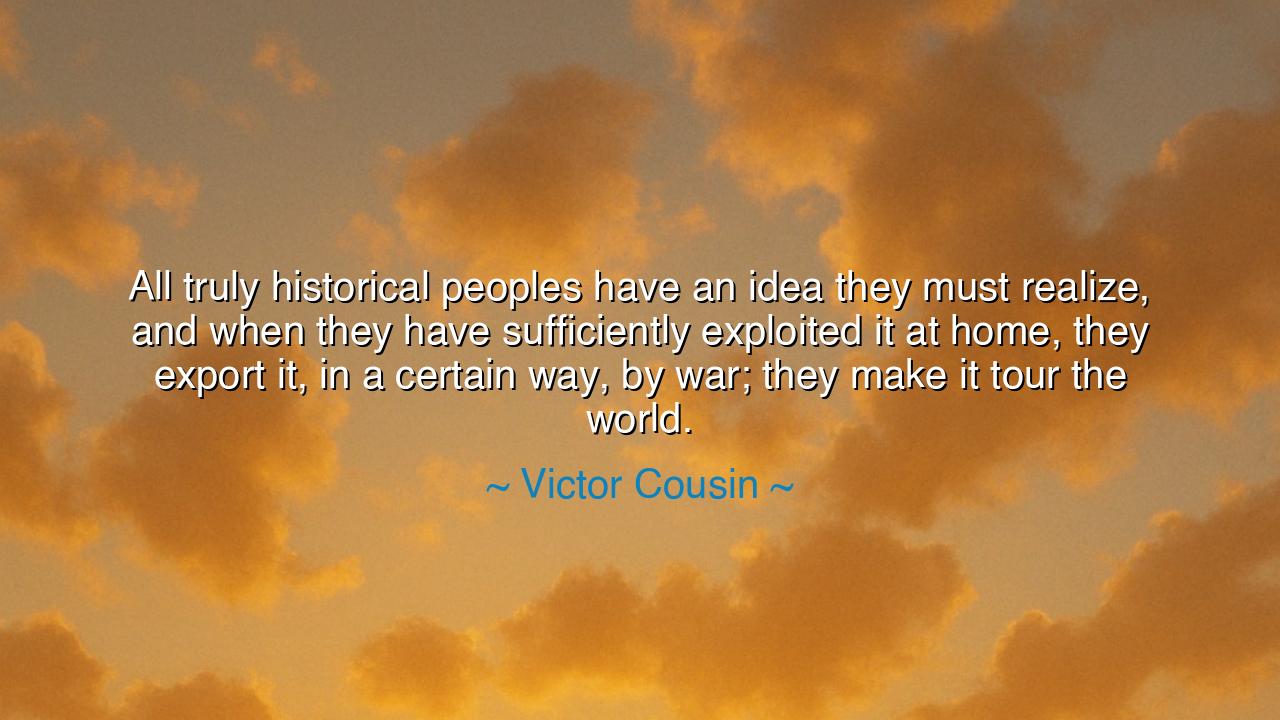
All truly historical peoples have an idea they must realize, and
All truly historical peoples have an idea they must realize, and when they have sufficiently exploited it at home, they export it, in a certain way, by war; they make it tour the world.






“All truly historical peoples have an idea they must realize, and when they have sufficiently exploited it at home, they export it, in a certain way, by war; they make it tour the world.” Thus wrote Victor Cousin, the philosopher of France, whose mind sought to understand not merely the flow of events, but the spirit that drives civilizations. In this striking declaration, Cousin does not glorify war; he reveals a law of history as old as time — that every great people, born of conviction and vision, seeks to bring its idea into the wider world. Whether for good or ill, the destiny of nations has always been to spread their inner truth — their religion, their governance, their culture — beyond their borders. And when persuasion fails, force too often becomes the handmaid of ideology.
Cousin lived in the first half of the nineteenth century, a time when Europe was reshaping itself in the aftermath of revolution and empire. He had seen Napoleon Bonaparte march across the continent, carrying with him not only armies, but the revolutionary principles of liberty, law, and equality — ideas born in France and baptized in blood. To Cousin, such movements were not accidents of ambition but manifestations of destiny: a people aflame with conviction cannot remain contained within its own walls. The idea, once matured, demands expression; it seeks to transform the world into its image. Thus, he wrote, all “truly historical peoples” — those who shape the destiny of mankind — are driven by a spiritual mission, one that inevitably bursts forth in expansion, conquest, or cultural dominion.
This truth is reflected in the grand procession of history. The Greeks, once a cluster of small city-states, carried their idea of reason and beauty across the world through the conquests of Alexander the Great. The sword of Macedonia was but the vehicle for the philosophy of Athens. Through their triumphs, Hellenic thought took root in Asia and Africa, and the seed of Western civilization was sown. Later, the Romans, with their iron discipline, brought their idea of law and order to every corner of the known world. Their legions marched not merely for territory but for the Pax Romana — the Roman peace — a vision of governance that still echoes in the justice systems of nations today. These were not random acts of power; they were the expansion of an idea, made flesh by the will of a people who believed they bore a gift — or a burden — to share with the world.
Yet Cousin’s words are also a warning. For though great ideas uplift, they can also consume. When a people confuses its mission with its dominance, it turns sacred conviction into imperial pride. The same zeal that built empires also destroyed them. The crusades, for instance, began as a quest to reclaim holy lands, yet they left behind ruins and resentment. The European colonizers of later centuries carried not only commerce and technology, but also arrogance — the belief that their way was the only way. Thus, the exportation of an idea, if untempered by humility, can become the weapon of oppression rather than enlightenment. Cousin’s insight, then, is not to praise this cycle, but to expose it — to show that the power of ideas is both the strength and the peril of humanity.
In our own age, the principle remains unchanged. The wars of old were fought with swords and cannons; today they are fought with culture, ideology, and technology. Nations still strive to make their ideas tour the world — through markets, media, and influence. Democracy, capitalism, communism, religion, and science have each, in their turn, sought to become the world’s ruling vision. We may call it globalization or progress, but beneath the names lies the same truth: that every civilization believes it has something universal to give, and in giving, it seeks to affirm its purpose. The battlefield has changed, yet the struggle endures — not of armies, but of beliefs contending for the soul of mankind.
But let us not see Cousin’s teaching as cynicism. For though the wars of ideas have caused suffering, they also reveal humanity’s yearning for meaning — the desire to shape existence according to a vision of the good. The wise do not curse this impulse; they guide it. A people must have an idea worth living for, but it must be an idea rooted in compassion, not conquest. The true triumph of a nation lies not in spreading its flag, but in sharing its wisdom; not in dominating the earth, but in illumining it. Just as the sun radiates light without seeking to possess what it touches, so too should civilizations shine their truths freely, without violence or pride.
So, my children, remember this: every age is an age of ideas, and every people has its mission. But beware the temptation to make your idea a weapon. Let it be a torch, not a sword. Before seeking to export your belief, make sure it has first brought peace within your own borders — within your own heart. For as Cousin teaches, a people becomes truly historical not when it conquers the world, but when it contributes something eternal to it. Live, then, as bearers of noble ideas — justice, kindness, truth — and let these tour the world, not through war, but through example. In this way, you too shall take your place among the “truly historical peoples,” whose greatness lies not in power, but in purpose.






AAdministratorAdministrator
Welcome, honored guests. Please leave a comment, we will respond soon